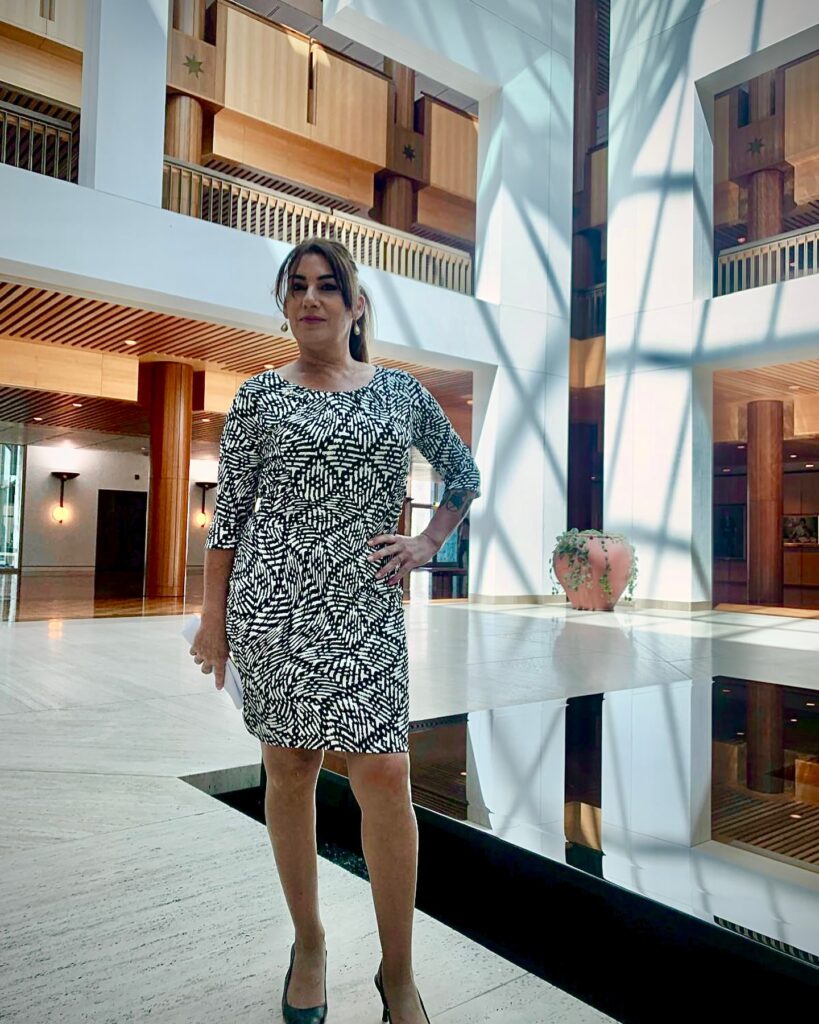Lidia Thorpe: Australian Senator

“Lidia Thorpe”, an Indigenous Australian Senator, is a name that has become synonymous with the fight for justice, equality, and Aboriginal rights. Born into a rich heritage and raised with a deep understanding of her culture, she is a formidable advocate for Indigenous Australians.
Throughout her political career, Thorpe has remained steadfast in her commitment to amplifying the voices of marginalized communities. But her journey is far from straightforward, marked by controversy, courage, and a passion for change. Let’s explore the life of this extraordinary figure, her background, political career, and the recent events that have brought her into the limelight, including the incident involving King Charles.
Early Life and Background
Lidia Thorpe was born on August 18, 1973, in Carlton, Victoria, Australia. She is a proud member of the Gunnai-Gunditjmara and Djab Wurrung peoples, and her connection to the land and her heritage runs deep. Raised by a single mother, Marjorie Thorpe, who was also a staunch advocate for Indigenous rights, Lidia’s early years were steeped in activism. Her grandmother, Alma Thorpe, was a member of the Australian Aboriginal Progressive Association, a pioneering group for Aboriginal rights in Australia. From a young age, Lidia was exposed to the struggles and challenges faced by Indigenous communities in Australia.
Growing up in an environment where activism was a way of life, Lidia was inspired to take on a leadership role in the fight for Indigenous rights. She attended Fitzroy High School in Melbourne, but life wasn’t easy for Thorpe. She became a mother at a young age and faced challenges, including domestic violence, that tested her resolve. These personal struggles, however, shaped her into the strong, resilient leader she is today.
Thorpe’s personal experiences of hardship and survival made her empathetic toward the underprivileged and instilled in her a deep desire to work toward societal change. Her lived experiences became her greatest motivator, driving her toward public service, not just for her people, but for all marginalized communities.

Education and Career
Lidia Thorpe’s formal education took place in Victoria, but her learning extended far beyond the classroom. As a member of the Indigenous community, she gained a profound understanding of the political and social challenges facing Aboriginal Australians. This knowledge, coupled with her own experiences, inspired her to become a political activist and community leader.
In her early career, Thorpe worked in various capacities that directly supported Indigenous communities. She was involved in programs aimed at improving housing, healthcare, and education for Aboriginal Australians.
Thorpe also worked as a businesswoman, running her consultancy firm, which focused on helping Indigenous businesses thrive. Her work in this space highlighted the gaps in economic opportunities for Indigenous people and motivated her to pursue change on a larger scale—through politics.
Entry into Politics: A Voice for the Voiceless

In 2017, Lidia Thorpe made history as the first Aboriginal woman elected to the Victorian Parliament. She was elected as a member of the Victorian Greens for the Northcote district, a significant milestone not only for her but for Indigenous representation in Australian politics. Thorpe used her platform to advocate for environmental issues, social justice, and most importantly, the rights of Indigenous Australians.
Her election signaled a new era in Victorian politics, one where Indigenous voices were finally being heard on a legislative level.
Thorpe’s tenure in the Victorian Parliament was marked by her advocacy for land rights, environmental protection, and the recognition of the historical wrongs committed against Indigenous Australians. She was a vocal opponent of policies that she believed disenfranchised Indigenous people, and her passionate speeches often resonated deeply with those who felt marginalized by the political system.
In 2020, Thorpe’s political career took a new turn when she was appointed to fill the Australian Senate seat vacated by former Greens Senator Richard Di Natale. This appointment made Thorpe the first Indigenous woman to represent Victoria in the Senate, further cementing her role as a trailblazer for Indigenous Australians in politics.
Political Career: Fight for Justice and Equality

As a Senator, Lidia Thorpe has continued to be a fierce advocate for Indigenous rights. She has used her position to bring attention to issues such as systemic racism, the mistreatment of Indigenous Australians, and the ongoing struggles for land rights and sovereignty. Thorpe has been a vocal critic of the Australian government’s treatment of Indigenous communities, particularly in areas such as incarceration rates, healthcare, and education.
Her stance on Indigenous sovereignty has been one of her most defining political positions. Thorpe believes that Australia’s current political system does not fully recognize the sovereignty of Indigenous peoples and has called for meaningful action to address the historical injustices committed against Aboriginal Australians. This includes advocating for a treaty between the Australian government and Indigenous nations, a cause that has been central to her political career.
In addition to her work on Indigenous issues, Thorpe has been a strong supporter of environmental conservation. She has consistently spoken out against large-scale mining projects that threaten Indigenous land and the environment. Thorpe’s commitment to environmental justice is intertwined with her advocacy for Indigenous rights, as she views the protection of the land as essential to the preservation of Indigenous cultures.

Controversies and Criticism
Lidia Thorpe’s outspoken nature and unyielding stance on certain issues have not come without controversy. Her direct and often confrontational approach to politics has made her a polarizing figure in Australian politics. Thorpe has never shied away from speaking her mind, even when her opinions have been at odds with mainstream political discourse.
One of the most significant controversies in Thorpe’s political career came in 2022 when she resigned from the Australian Greens. Thorpe had long been at odds with the party over its approach to Indigenous issues, particularly the proposed Indigenous Voice to Parliament. While the Greens supported the Voice as a way to provide Indigenous Australians with greater representation in government, Thorpe argued that it did not go far enough. She believed that a treaty and full recognition of Indigenous sovereignty should take precedence over the Voice. Her resignation from the Greens was a bold move, signaling her unwillingness to compromise on her principles.
Since leaving the Greens, Thorpe has continued her work in the Senate as an independent. Her decision to go it alone has allowed her to remain true to her beliefs and continue advocating for the issues she holds dear without being constrained by party politics.
Lidia in Limelight
In October 2024, Lidia Thorpe made headlines once again, this time on the international stage. During a high-profile visit by King Charles III to Australia, Thorpe heckled the monarch, calling out for justice for Indigenous Australians. The incident occurred as King Charles was addressing the Australian Parliament, and Thorpe interrupted his speech by shouting, “When will you pay for the bloodshed of my people?”
Thorpe’s heckling of King Charles was met with mixed reactions. Some viewed her actions as disrespectful and inappropriate, while others saw them as a courageous stand against colonialism and the ongoing impact of British rule on Indigenous Australians. Thorpe later defended her actions, stating that her intent was to draw attention to the unresolved issues of Indigenous sovereignty and the historical injustices committed by the British Crown.
The incident garnered international media attention, with many commentators debating the appropriateness of Thorpe’s actions and the broader issue of reconciliation between Indigenous Australians and the British monarchy. Thorpe’s bold move reignited conversations about Australia’s colonial past and the need for meaningful action to address the grievances of Indigenous peoples.
The heckling of King Charles brought Lidia Thorpe into the spotlight once again, but it is just one example of her continued fight for justice. Thorpe has been a vocal critic of Australia’s relationship with the British monarchy, calling for the country to sever its ties with the Crown and become a republic. She has also pushed for reparations for Indigenous Australians and greater recognition of their rights.
In addition to the King Charles incident, Thorpe has been in the news for her ongoing advocacy for Indigenous sovereignty. She has consistently called for a treaty with Indigenous nations and has criticized the Australian government for not doing enough to address the issues facing Indigenous communities.
Thorpe’s refusal to back down in the face of criticism has earned her both admirers and detractors. While some see her as a radical who is out of step with mainstream politics, others view her as a fearless advocate for justice who is willing to speak truth to power, no matter the consequences.
Legacy and Impact
Lidia Thorpe’s legacy is still being written, but there is no doubt that she has already made a significant impact on Australian politics. As the first Aboriginal woman to serve in both the Victorian Parliament and the Australian Senate, she has broken barriers and paved the way for future generations of Indigenous leaders.
Thorpe’s work in the areas of Indigenous rights, environmental protection, and social justice has brought attention to issues that are often overlooked in Australian politics. Her unapologetic approach to advocacy has inspired many, particularly within the Indigenous community, to continue the fight for equality and justice.
Thorpe’s influence extends beyond her political achievements. As a woman who has overcome personal struggles to become a powerful voice for her people, she serves as a role model for those who face adversity. Her story is a testament to the power of resilience and the importance of standing up for what you believe in.
Conclusion
Lidia Thorpe is a politician unlike any other. Her journey from a young Indigenous girl growing up in a politically active family to becoming one of the most outspoken voices in Australian politics is a remarkable story of courage, determination, and unwavering commitment to justice. While her methods may be controversial, there is no denying that Thorpe has succeeded in bringing attention to the issues that matter most to her and her community. As she continues her work in the Australian Senate, it is clear that Lidia Thorpe will remain a force to be reckoned with in Australian politics for years to come.
Disclaimer
The blog presented here is intended for informational purposes only and does not represent the views of any particular political group or individual. The details provided are based on publicly available information and news reports as of October 2024. While every effort has been made to ensure accuracy, some events or details may evolve over time. The actions and statements of individuals, including Lidia Thorpe, should be understood in the context of their time and position. The author and publisher are not responsible for any potential inaccuracies or misunderstandings arising from the interpretation of this content. Readers are encouraged to conduct further research and critically assess the information presented to form their own opinions on the subject matter.
Images credit to FB of Lidia Thorpe


